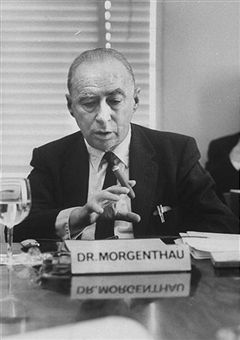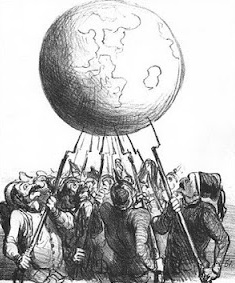Neorealism or structural realism is a theory of international relations that emphasizes the role of power politics in international relations, sees competition and conflict as enduring features and sees limited potential for cooperation. The anarchic state of the international system means that states cannot be certain of other states' intentions and their security, thus prompting them to engage in power politics.

Hegemony is the political, economic, and military predominance of one state over other states. Hegemony can be regional or global.
In international relations, power is defined in several different ways. Material definitions of state power emphasize economic and military power. Other definitions of power emphasize the ability to structure and constitute the nature of social relations between actors. Power is an attribute of particular actors in their interactions, as well as a social process that constitutes the social identities and capacities of actors.
Power politics is a theory of power in international relations which contends that distributions of power and national interests, or changes to those distributions, are fundamental causes of war and of system stability.

Hans Joachim Morgenthau was a German-American jurist and political scientist who was one of the major 20th-century figures in the study of international relations. Morgenthau's works belong to the tradition of realism in international relations theory; he is usually considered among the most influential realists of the post-World War II period. Morgenthau made landmark contributions to international relations theory and the study of international law. His Politics Among Nations, first published in 1948, went through five editions during his lifetime and was widely adopted as a textbook in U.S. universities. While Morgenthau emphasized the centrality of power and "the national interest," the subtitle of Politics Among Nations—"the struggle for power and peace"—indicates his concern not only with the struggle for power but also with the ways in which it is limited by ethical and legal norms.

John Joseph Mearsheimer is an American political scientist and international relations scholar, who belongs to the realist school of thought. He is the R. Wendell Harrison Distinguished Service Professor at the University of Chicago. He has been described as the most influential realist of his generation.
Bandwagoning in international relations occurs when a state aligns with a stronger, adversarial power and concedes that the stronger adversary-turned-partner disproportionately gains in the spoils they conquer together. Bandwagoning, therefore, is a strategy employed by states that find themselves in a weak position. The logic stipulates that an outgunned, weaker state should align itself with a stronger adversary because the latter can take what it wants by force anyway. Thucydides' famous dictum that "the strong do what they can and the weak suffer what they must" captures the essence of bandwagoning.
In international relations, the security dilemma is when the increase in one state's security leads other states to fear for their own security. Consequently, security-increasing measures can lead to tensions, escalation or conflict with one or more other parties, producing an outcome which no party truly desires; a political instance of the prisoner's dilemma.
The Twenty Years' Crisis: 1919–1939: An Introduction to the Study of International Relations is a book on international relations written by E. H. Carr. The book was written in the 1930s shortly before the outbreak of World War II in Europe and the first edition was published in September 1939, shortly after the war's outbreak; a second edition was published in 1945. In the revised edition, Carr did not "re-write every passage which had been in someway modified by the subsequent course of events", but rather decided "to modify a few sentences" and undertake other small efforts to improve the clarity of the work.

Realism is one of the dominant schools of thought in international relations theory, theoretically formalizing the Realpolitik statesmanship of early modern Europe. Although a highly diverse body of thought, it is unified by the belief that world politics is always and necessarily a field of conflict among actors pursuing wealth and power. The theories of realism are contrasted by the cooperative ideals of liberalism in international relations.
Polarity in international relations is any of the various ways in which power is distributed within the international system. It describes the nature of the international system at any given period of time. One generally distinguishes three types of systems: unipolarity, bipolarity, and multipolarity for three or more centers of power. The type of system is completely dependent on the distribution of power and influence of states in a region or globally.

Buck passing, or passing the buck, or sometimes (playing) the blame game, is the act of attributing to another person or group one's own responsibility. It is often used to refer to a strategy in power politics whereby a state tries to get another state to deter or fight an aggressor state while it remains on the sidelines.
Offshore balancing is a strategic concept used in realist analysis in international relations. It describes a strategy in which a great power uses favored regional powers to check the rise of potentially-hostile powers. This strategy stands in contrast to the dominant grand strategy in the United States, liberal hegemony. Offshore balancing calls for a great power to withdraw from onshore positions and focus its offshore capabilities on the three key geopolitical regions of the world: Europe, the Persian Gulf, and Northeast Asia.
Offensive realism is a structural theory in international relations that belongs to the neorealist school of thought and was put forward by the political scholar John Mearsheimer in response to defensive realism. Offensive realism holds that the anarchic nature of the international system is responsible for the promotion of aggressive state behavior in international politics. The theory fundamentally differs from defensive realism by depicting great powers as power-maximizing revisionists privileging buck-passing and self-promotion over balancing strategies in their consistent aim to dominate the international system. The theory brings important alternative contributions for the study and understanding of international relations but remains the subject of criticism.

The balance of power theory in international relations suggests that states may secure their survival by preventing any one state from gaining enough military power to dominate all others. If one state becomes much stronger, the theory predicts it will take advantage of its weaker neighbors, thereby driving them to unite in a defensive coalition. Some realists maintain that a balance-of-power system is more stable than one with a dominant state, as aggression is unprofitable when there is equilibrium of power between rival coalitions.
Defensive neorealism is a structural theory in international relations that is derived from the school of neorealism. The theory finds its foundation in the political scientist Kenneth Waltz's Theory of International Politics in which Waltz argues that the anarchical structure of the international system encourages states to maintain moderate and reserved policies to attain national security. In contrast, offensive realism assumes that states seek to maximize their power and influence to achieve security through domination and hegemony. Defensive neorealism asserts that aggressive expansion as promoted by offensive neorealists upsets the tendency of states to conform to the balance of power theory, thereby decreasing the primary objective of the state, which they argue to be the ensuring of its security. Defensive realism denies neither the reality of interstate conflict or that incentives for state expansion exist, but it contends that those incentives are sporadic, rather than endemic. Defensive neorealism points towards "structural modifiers," such as the security dilemma and geography, and elite beliefs and perceptions to explain the outbreak of conflict.

Theory of International Politics is a 1979 book on international relations theory by Kenneth Waltz that creates a structural realist theory, neorealism, to explain international relations. Taking into account the influence of neoclassical economic theory, Waltz argued that the fundamental "ordering principle" (p. 88) of the international political system is anarchy, which is defined by the presence of "functionally undifferentiated" (p. 97) individual state actors lacking "relations of super- and subordination" (p. 88) that are distinguished only by their varying capabilities.
Politics Among Nations: The Struggle for Power and Peace is a political science book by Hans Morgenthau published in 1948.

The Tragedy of Great Power Politics is a book by the American scholar John Mearsheimer on the subject of international relations theory published by W.W. Norton & Company in 2001. Mearsheimer explains and argues for his theory of "offensive realism" by stating its key assumptions, evolution from early realist theory, and its predictive capability. An article adapted from the book had previously been published by Foreign Affairs.
Liberal institutionalism is a theory of international relations that holds that international cooperation between states is feasible and sustainable, and that such cooperation can reduce conflict and competition. Neoliberalism is a revised version of liberalism. Alongside neorealism, liberal institutionalism is one of the two most influential contemporary approaches to international relations.







